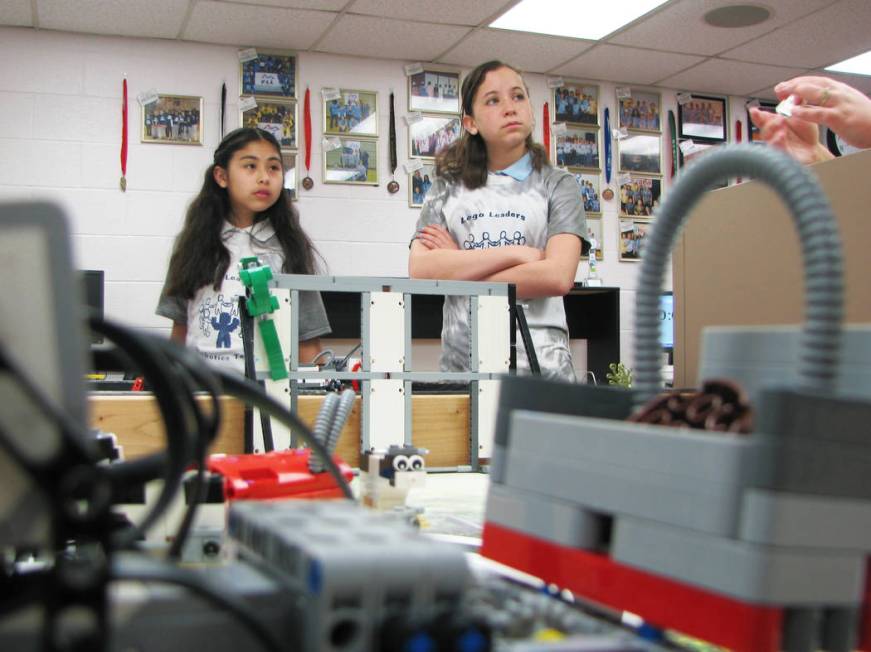Team from Jo Mackey Academy builds Lego robots to do bidding

For students on coach Rachel Kuntz’s Lego Leaders team, building is just the start of the challenge.
At a typical session, students rapidly tap commands into a pad on the back of a robot built of Legos, then watch hopefully as it rolls into a maze of strange constructions and rolls back after completing a task. Then they grab it, swap parts and send it out for another task, all while racing against time, team members and themselves.
“At the beginning of the year we split into three teams, and each team built a robot,” said 10-year-old fifth-grader and team captain Esteban Dominguez. “Then we came back together and talked about it and made some changes for the final robot.”
The team from Jo Mackey Academy of Leadership and Global Communication through Technology, at 2726 Englestad St. in North Las Vegas, has won the First Lego League Southern Nevada State Championship five times. Because of an unusual set of rules, both the Southern Nevada and Northern Nevada winners are considered state champions, although each region has taken turns attending the annual First Lego League World Festival.
“We’ve won five times but only gone to the World Festival three times because of that (rule),” Kuntz said. “That may change after this year because the organizers have added another event so more teams can attend. This same team went to the World Festival in St. Louis last year, and they’re going to the World Festival in Houston this year.”
Kuntz doesn’t like using the term competition, preferring the word the international organizers coined: coopertition.
“It’s cooperation within competition,” Kuntz said. “It’s competing, but working with each other and the other teams so that all of us do well, improve and have fun. It’s part of the core-values component of the event.”
Kuntz noted that while the robotics gets all the glory, the event also involves a research component on a solution to a real-world problem with a presentation.
This year’s team at Jo Mackey Academy has tackled the issue of lost dogs by proposing a GPS chip that improves on current pet-tracking technology and is aimed at allowing owners to retrieve lost dogs in minutes. The team will present its conclusions in Houston with a skit including costumes and music aided with a speech presented by all the team members.
At the beginning of the school year, all teams are presented with a 4-foot-by-8-foot “field” and a list of missions. Teams build robots using Lego Mindstorms pieces designed to complete the tasks. Rather than build one multi-armed robot, a team builds a robot that can be fitted with specialized attachments that can be easily swapped, a process that can only be done when a robot returns to the base that is in a corner of the field.
The theme of this year’s competition is “Animal Allies” and the challenges include “Milking Automation,” “Panda Release” and “Shark Shipment.” The team has to program the robots on the fly to perform a task and return to the base to score. If a task involves the same attachment, the team can have the robot perform multiple tasks before returning, but in some cases, it has to keep track of the time remaining to ensure the robot makes it back to the base.
Two members of the team work on each round, swapping out attachments and programming. Like the robot itself, the programming system, created by Lego, is block-based.
The third element of the event is core values. The judges note how the teams work together and respect one another.
“For us, that’s the most important part of the competition,” Kuntz said. “Whether or not they go into engineering, the gracious professionalism and coopertition is the thing they take with them for the rest of their lives.”
To reach East Valley View reporter F. Andrew Taylor, email ataylor@viewnews.com or call 702-380-4532.